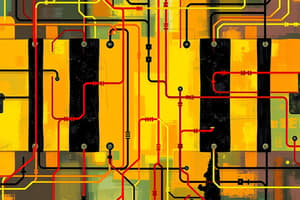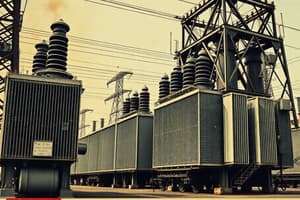Podcast
Questions and Answers
What is the primary role of electricians in power systems?
What is the primary role of electricians in power systems?
- Developing new types of power systems
- Managing electricity distribution to consumers
- Designing and building power plants
- Maintaining and repairing electrical equipment (correct)
Which term is used to describe the interconnected network of generators, transformers, and transmission lines in a power system?
Which term is used to describe the interconnected network of generators, transformers, and transmission lines in a power system?
- Energy web
- Electric grid (correct)
- Current circuit
- Power network
What distinguishes industrial power systems from utility power systems?
What distinguishes industrial power systems from utility power systems?
- They provide electricity to homes and businesses
- They use only AC power systems
- They operate at higher voltages (correct)
- They are not interconnected networks
In the context of power systems, what do electricians ensure about the electrical systems in homes, businesses, and industrial facilities?
In the context of power systems, what do electricians ensure about the electrical systems in homes, businesses, and industrial facilities?
What is the primary responsibility of electricians when designing power systems?
What is the primary responsibility of electricians when designing power systems?
Which type of power system uses sinusoidal voltage and current waves?
Which type of power system uses sinusoidal voltage and current waves?
In which type of power system can the voltage and current be unidirectional or bidirectional?
In which type of power system can the voltage and current be unidirectional or bidirectional?
What is a crucial responsibility of electricians when maintaining power systems?
What is a crucial responsibility of electricians when maintaining power systems?
When a power system experiences issues, what is a common task electricians are called upon to perform?
When a power system experiences issues, what is a common task electricians are called upon to perform?
In which step of the power system process do electricians set up generators, transformers, and transmission lines?
In which step of the power system process do electricians set up generators, transformers, and transmission lines?
Study Notes
Electrician: Understanding the Power System
Electricians are professionals who specialize in installing, maintaining, and repairing electrical systems. They work on a wide range of electrical equipment and systems, including power systems. In this article, we will explore the world of electricians and their role in power systems.
What is a Power System?
A power system is an interconnected network of generators, transformers, transmission lines, and load devices that work together to deliver electrical energy from power plants to consumers. There are two primary types of power systems:
-
Utility Power Systems: Also known as the grid, these systems are the backbone of the modern world. They provide electricity to homes, businesses, and other facilities, and can be either AC or DC power systems.
-
Industrial Power Systems: These systems are designed to provide power for specific industrial applications, such as manufacturing processes. They can be either AC or DC power systems, depending on the requirements of the equipment being used.
The Role of Electricians in Power Systems
Electricians play a crucial role in the design, installation, and maintenance of power systems. They are responsible for ensuring that the electrical systems in homes, businesses, and industrial facilities are safe and reliable. Some of the key tasks that electricians perform in the context of power systems include:
-
Designing Power Systems: Electricians work with engineers to design power systems that meet the specific needs of their clients. This involves selecting the appropriate equipment, determining the optimal layout, and ensuring compliance with safety regulations.
-
Installing Power Systems: After the design is complete, electricians oversee the installation of the power system. This involves setting up the generators, transformers, transmission lines, and other necessary components.
-
Maintaining Power Systems: Electricians are responsible for maintaining power systems to ensure they continue to operate efficiently and safely. This involves regular inspections, repairs, and upgrades to the equipment as needed.
-
Troubleshooting Power Systems: If a power system experiences issues, electricians are often called upon to diagnose and resolve the problem. This can involve a variety of techniques, from checking for loose connections to performing more complex repairs.
Types of Power Systems
There are two primary types of power systems: AC (Alternating Current) and DC (Direct Current) systems. While both types of systems can be used in various applications, they have distinct characteristics and uses.
-
AC Power Systems: AC systems are the most commonly used power systems in the world. They are characterized by the use of sinusoidal voltage and current waves, which are constantly changing direction.
-
DC Power Systems: DC systems are typically used in specific applications where the use of AC power is impractical or not feasible. These systems use a constant voltage and current, which can be either unidirectional or bidirectional.
Conclusion
Electricians are essential professionals who play a critical role in the design, installation, and maintenance of power systems. They work on various types of power systems, including utility and industrial systems, and are responsible for ensuring that these systems operate safely and efficiently. Understanding the power system and the role of electricians is crucial for anyone interested in pursuing a career in electrical engineering or related fields.
Studying That Suits You
Use AI to generate personalized quizzes and flashcards to suit your learning preferences.
Description
Test your knowledge about power systems and the role of electricians in designing, installing, and maintaining electrical systems. Explore the types of power systems, including utility and industrial systems, AC and DC power systems, and the crucial tasks performed by electricians.




